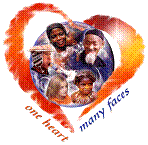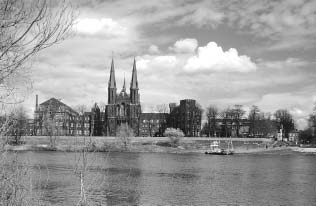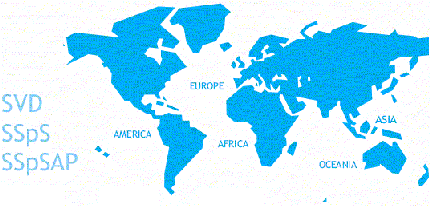


|
Holland - 1875 China - 1882 Italy - 1888 Austria - 1889 Germany - 1889 Argentina - 1889 Togo - 1892 Ecuador - 1893 Brazil - 1895 Papua N.Guinea - 1896 Australia - 1900 Chile - 1900 USA - 1905 Japan - 1906 Philippines - 1909 Paraguay - 1910 Mozambique - 1911 Indonesia - 1913 Poland - 1920 (1892) Switzerland - 1920 Slovakia - 1923 Hungary - 1924 England - 1930 Belgium - 1928 Australia - 1929 India - 1932 Ghana - 1938 Ireland - 1939 Spain - 1945 Portugal - 1949 Canada - 1950 Zaire - 1951 Taiwan - 1954 Congo - 1957 Mexico - 1962 Colombia - 1964 Angola - 1965 Yugoslavia - 1970 Hong Kong - 1979 Botswana - 1981 South Korea - 1984 Kenya - 1984 New Zealand - 1985 Madagascar - 1989 Belarus/Russia - 1991 Bolivia - 1991 Vietnam - 1998 Thailand - 1999 Tanzania - 1999 South Africa - 2001 Chad - 2004 |

|
Trên Toàn Thế Giới |
|
The Divine Word Missionaries today
In early 1875, when Arnold Janssen went to Archbishop Paul Mechers of Cologne to present a plan to establish a house for the foreign missions, the bishop said, “We live in a time when everything seems to be shaking and sinking. Now you are coming and want to start something new?” Fr. Janssen replied: “We live in a time when much is collapsing and new things must be established in their place.” This attitude of the founder of the Divine Word Missionaries, developed and sustained by his intense life of prayer and unceasing search for God’s will, enabled him to persevere in his vision. On September 8, 1875, with a few companions, and in spite of doubts, reservations and material poverty, he established German-speaking Europe’s first mission house in the tiny village of Steyl on the River Maas in the Netherlands. Contrary to general expectations, the Mission House of Steyl quickly became widely known and ten years later had already become a Mission Congregation. When Arnold Janssen died (1909) it numbered one thousand members (priests and brothers) serving all over the world. |
|
His statement sums up the trust on which his life grounded. With the same trust, today’s 6000 Divine Word Missionaries continue their mission especially: · In pastoral ministry, in building up and accompanying church communities. Priests and Brothers work together as pastoral ministers and collaborators in the most diverse social projects. · In the proclamation of the Word of God. As “Society of the Divine Word” they see a special obligation to promote the biblical apostolate. · In commitment to justice, peace and the integrity of creation. This commitment permeates all individual activities and projects. In the fields of media, communication and research. Through these the Church’s mission as respectful dialogue with all people, following the example of Jesus Christ, will be increasingly deepened and more generally effective.
Our Missionary Life and Service today
In creative fidelity to Saint Arnold and according to their Constitutions of 1983/2000 and the resolutions of recent General Chapters, the Divine Word Missionaries define themselves thus:
Our Calling
In accordance with the words of Jesus Christ, “Peace be with you! As the Father sent me, so I send you” (Jn 20:21), we are willing to leave our country, language and culture and to go wherever the Church sends us. This availability is the essential mark of our missionary vocation.
Our Society
We are a Catholic religious congregation with lay and clerical members, living in international and multicultural communities. Through this we witness to the worldwide Church and to fraternal relations. Through the vows (poverty, celibacy, obedience) we bind ourselves to this missionary congregation.
Our Mission
We work especially in areas where the gospel has not yet or has only insufficiently been proclaimed and where the local Church is not yet viable on its own. The example of Jesus, the Word made Flesh, guides us as we live out our mission. Open and full of respect for the religious and cultural traditions of all people, we seek dialogue with all and share the Good News of God’s love with them. Our particular service is to enter into dialogue with people who: · do not have a faith community and are Faith Seekers, · are poor and marginalized, · are of different cultures and · are of different religious traditions and secular ideologies. |
|
The Religious Family of Steyl today
|


|
|
|
EUROPE |
AMERICA |
AFRICA |
In its origins, the |
||||
|
■▲ |
Austria |
■ |
Anguilla |
■▲ |
Angola |
||
|
■ |
Belgium |
■▲ |
Antigua |
■ |
Benin |
||
|
■ |
Byelorussia |
■▲● |
Argentina |
■▲ |
Botswana |
||
|
■ |
Croatia |
■▲ |
Bolivia |
■▲ |
Congo |
||
|
■▲ |
Czech Republic |
■▲● |
Brazil |
■▲ |
Ethiopia |
||
|
■▲ |
England |
■ |
Canada |
■▲ |
Ghana |
||
|
■ |
France |
■▲ |
Chile |
■ |
Kenya |
||
|
■▲● |
Germany |
■ |
Columbia |
■ |
Madagascar |
||
|
■ |
Hungary |
■▲ |
Cuba |
■▲ |
Mozambique |
||
|
■▲ |
Ireland |
■ |
Ecuador |
■▲ |
Republic of South Africa |
||
|
■▲ |
Italy |
■ |
Jamaica |
■ |
Tanzania |
||
|
■▲ |
Moldavia |
■▲ |
Mexico |
■▲● |
Togo |
||
|
■▲● |
Netherlands |
■ |
Montserrat |
■▲ |
Zambia |
||
|
■▲● |
Poland |
■ |
Nevis-St. Kitts |
■ |
Zimbabwe |
||
|
■▲ |
Portugal |
■ |
Nicaragua |
|
|
||
|
■▲ |
Romania |
■ |
Panama |
ASIA |
|||
|
■▲ |
Russia |
■▲ |
Paraguay |
■▲ |
China |
||
|
■ |
Serbia |
■▲● |
USA |
■▲● |
India |
||
|
■▲ |
Slovakia |
|
|
■▲● |
Indonesia |
||
|
■▲ |
Spain |
OCEANIA |
■▲ |
Japan |
|||
|
■▲ |
Switzerland |
■▲ |
Australia |
■▲ |
Korea |
||
|
■▲ |
Ukraine |
■ |
New Zealand |
■▲● |
Philippines |
||
|
|
|
■▲ |
Papua New Guinea |
■▲ |
Taiwan |
||
|
|
|
|
|
■ |
Thailand |
■ |
SVD |
|
|
|
|
|
■▲ |
Timor Loro Sae |
▲ |
SSpS |
|
|
|
|
|
■▲ |
Vietnam |
● |
SSpSAP |


